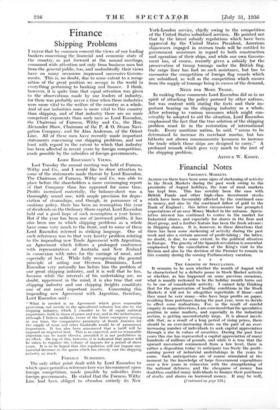Finance
Shipping Problems
I THINK that by common consent the views of our leading bankers concerning the financial and economic state of the country, as put forward at the annual meetings, command wide attention not only from business men but from the general public, too, and undoubtedly their views have on many occasions impressed successive Govern- ments. This is, no doubt, due to some extent to a recog- nition of the great position we occupy in the world in everything pertaining to banking and finance. I think, however, it is quite time that equal attention was given to the observations made by our leaders of industry, for there was probably never a time when those industries were more vital to the welfare of the country as a whole. And of our industries none is more vital to this country than shipping, and of that industry there are no more competent exponents than such men as Lord Essendon, the Chairman of Furness, Withy and Co., the Hon. Alexander Shaw, Chairman of the P. & 0. Steam Navi- gation Company, and Sir Alan Anderson, of the Orient Line. All of these men have recently made important statements concerning our shipping problems, and not leaSt with regard to the extent to which that industry has been affected in recent years by foreign competition, made possible by the subsidies of foreign governments.
LORD ESSENDON'S VIEWS.
Last Tuesday the annual meeting was held of Furness, Withy and Co., and I would like to draw attention to some of the statements made thereat by Lord Essendon. The Chairman of Furness, Withy and Co. was able to place before the 'shareholders a more encouraging report of that Company than has appeared for some time. Profits increased materially, the balance-sheet was a thoroughly sound one, with ample provision for depre- ciation of steamships, and though, in pursuance of a cautious policy, there has been no resumption this year of dividends on the Ordinary Share capital, Lord Essendon held out a good hope of such resumption a year hence. But if the year has been one of increased profits, it has also been one in which shipping problems as a whole have come very much to the front, and to some of these Lord Essendon referred in striking language. One of such references was to that very knotty problem relating to the impending new Trade Agreement with Argentina, an Agreement which follows a prolonged conference with representatives of Australia and New Zealand in connexion with rates for the carriage of meat, and especially of beef. While fully recognising the general principle of aiding our Oversea Dominions, Lord Essendon very naturally has before him the problem of our great shipping industry, and it is well that he has, because while the interests of his undertaking are, no doubt, uppermost in the mind, it is also true that our shipping industry and our shipping freights constitute one of our most important assets. Concerning this impending new Agreement with Argentina, therefore, Lord Essendon said :
" What is needed is an Agreement which gives reasonable protection, not merely to the agricultural industry but also to the shipping industry, which I consider "to be of equal national importance, both in times of peace and war, and in the unfortunate, although I believe unlikely, event of the latter emergency arising at any time, the comparative proximity of South. America for the supply of meat and other foodstuffs would be of paramount importance. It has also been announced that a tariff will be imposed on imported beef. This is as expected, and no reasonable objection can be made thereto, provided it is not prohibitive in its effect. On top of this, however, it is indicated that power will be taken to regulate the volume of imports for a period of three years. It is to be hoped that this regulation will not impose any material decrease in the quota which has already cost the shipping industry so much.
• FOREIGN SUBSIDIES.
The only other point dealt with by Lord Essendon to which space permits a reference here was his comment upon foreign competition, made possible by subsidies from foreign governments. He stated that the Furness. Withy Line had been obliged to abandon entirely its New York-London service, chiefly owing to the competition of the United _States Subsidised services. He pointed out that by the latest subsidy regulations which have been approved -.by, the United States President, Atatican shipowners engaged in oversea trade will be entitled to government assistance in regard- to both construction and operation of their ships, and while our own Govern- ment has, of course, recently given a subsidy for the preservation of tramp tonnage under the British flag, the cargo liner has had no such assistance, but has to encounter the competition of foreign flag vessels which are subsidised, as well as the competition which ensues from the supply of tonnage being in excess of the demand.
NEED FOR MORE TRADE.
In making these comments Lord Essendon did' so in rio spirit of attacking the policy pursued by other nations, but was content with stating the facts and their im- portant bearing on the shipping industry as a whole. After referring to various measures which might con- ceivably be adopted to aid the situation, Lord Essendon emphasised the fact that the true solution of the shipping problem must lie in the restoration of international trade. Every maritime nation, . he said, " seems to be determined to increase its merchant marine, but has hitherto not shown commensurate keenness to increase the trade which those ships are designed to carry." A profound remark which goes very much to the root of the shipping problem.
ARTHUR W. KIDDY.






































 Previous page
Previous page